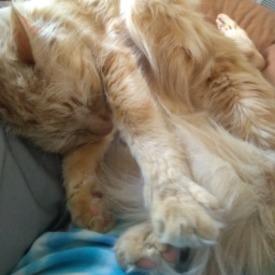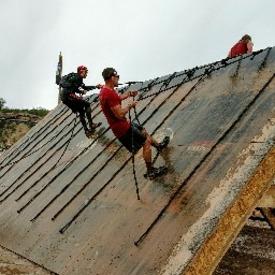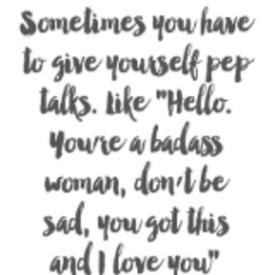Fitness Trackers-Beneficial or fad?

mikhnpaitsmum
Posts: 119 Member
Im seeing alot of people using fitness trackers, counting every step taken, how much sleep, heart rate ect. I have been on the fence about getting one. I am curious what others think about these trackers. Are they beneficial or just a fad?
0
Replies
-
It's beneficial if it motivates you to move more, it's a fad if you expect it to do the work for you or if you blindly trust the numbers. I find it beneficial because I like numbers and it allows me to keep track of my calories burned, after calibrating the burn to my weight loss results. Personally, I think the heart rate feature is a useless outside of knowing your resting heart rate and can make results less accurate, at least in my experience. For training to heart rate zones, I find a dedicated heart rate monitor better for the job.5
-
I don't have one and I never had the desire or need for a fitness tracker. Some people like to see numbers and data, analyze their fitness progress, steps, sleep patterns, etc., and others use the trackers as away to control their calories. For many it is an incentive and something that they really like and treasure, but for me a tracker would be a nuisance. I don't like gadgets (hey, I don't even wear a watch!).
It may also depend on your goals. What benefit do you want to get out of it, and are you really going to wear one all the time, as intended.
If they are beneficial or a fad, depends on the eye of the beholder.3 -
I like the gadgets, and i have one. I live the numbers and the extra data that tracker provides. So i find it useful for me. I check my sleep patterns, resting heart rate, which has decreased in the last few months (yeah!), heart rate zones that i hit during workout, etc. I don't wear it all the time, because i find it annoying that I can't see time when i look at it as reliably as my watch would show, plus i love my watch too much and miss it when it's not on my wrist.0
-
Normally, I hate technology, but I love my tracker. I like the numbers so far as that it gives me goals that I take like a game. For instance, it's cold, windy and raining here today. Not going to go out for a walk. So I'm tracking myself walking around the house, aiming for my daily goal by using mini goals throughout the day. When it's nice out, I try to do a two-mile walk before work. And if you use a Garmin like I do, you can also "compete" against others (sometimes that's a good thing, but not always.)1
-
Survey data shows a majority of people use a tracker for up to a year and then quit. They also don't seem to affect results over populations. I don't see them going away though, from a sales standpoint. I there's a lot of money to be made with each new feature pushing a new product on the shelves. So I say it depends whether they are a fad or not, on how you look at it.
Me, I can't get enough. Although I've been tracking my activity for decades. I used to measure a string on topo maps and track my results in a book. GPS and wearables have made my tracking a lot easier!0 -
I like having one, and have used it for over a year, with no plans to stop. I have a sedentary job, have my fitbit synced with MFP, so I get extra calories on weekends and days I'm not glued to my desk.1
-
I have a Garmin Fenix 3 HR and love it. It has a continuous HRM and calculates calories burned 24 hours per day and calculates performance metrics, counts steps and stairs ascended, has GPS, tracks sleep, has an altimeter, barometer, and temp sensor, is waterproof to 100m so you can track swims, integrates with your phone through Bluetooth, and a lot of other functions. It has a long battery life and the associated phone app is easy to use. It also has customizable watch faces and you can change watch bands so it can coordinate with pretty much anything you wear (at work, social events, etc.)
I think that exercise data keeps fitness interesting, I love seeing my stats after a workout, and yeah, if I didn't measure it digitally then it never happened...1 -
It's both.
In general terms, it might be called a fad, specially given, as have been said above, most people who get one, use it up to a year and quit, and for most people it doesn't last for more than month or two. In that way it is similar to gym membership - less than 10% of people who join a gym, go there regularly for more than 3 months.
But for those who find it helps to keep them motivated or whose who like data, fitness trackers are genuinely useful.
I am one of those people. I've been using a fitness tracker or sports watch of some sort for 4 years now and I can't imagine being without one. But then again I am a total gadget nerd too, so I might be an outlier.1 -
I like mine for all that has been said above as well as for the fact that I'm directionally challenged and like to trail run. My watch has a nice little breadcrumb feature that I can use to back track when I take the wrong fork and end up who knows where (happens more often than I'd care to admit).2
-
I remember the fitness world before fitness trackers, and if you love tedium and manually tracking everything, then it was a great era for fitness! For a run, I would go out in advance in my vehicle, measure out my route in miles via the odometer, come back home, put on my cheap digital wristwatch/stopwatch, measure the pace by dividing out the miles I had ran by the overall time, and later write everything in a journal.
Which mile was my best mile? I never knew - there were “lap buttons” on some watches if you knew which mile you were at, but I generally didn’t because I ran rural roads (some roads had competing spray painted mile markers, good luck trusting them, lol). What were the altitude changes? I don’t know - unless I wanted to go to the library and consult topographical maps, I could only guess. What was my average HR, max HR, and cadence? Haha, right.
Now I just push a few buttons on my fitness tracker and have constant data about my run while I’m running – if my pace is slipping, I can correct it. If part of my route gets flooded out, I can change course and improvise while still knowing my total mileage. Everything gets uploaded and is available to review versus me sitting down with a pencil and paper and writing all of the details out. I work out 4-6 hours per week and I honestly can’t envision coherently keeping track of my fitness regimen without a fitness tracker.3 -
I never used to wear one...my exercise volume used to be pretty high and none of it was really stepped based so I didn't see the point.
For a variety of reasons, I decided in 2018 to pull back on the amount of exercise/training I was doing...namely I was feeling really out of balance. Because of that, I decided to go ahead and get a FitBit and start looking at my general activity a little closer. I felt like it was important to increase my general activity if I was going to decrease my exercise activity.
I shoot for about 8-10K steps per day and it buzzes me every hour when I'm at work if I haven't gotten my hourly steps in, so it's a good reminder for me because I can literally sit at my desk pretty much all day and never move except to go to the rest room.
My dog loves it because she gets a walk most mornings1 -
Bry_Fitness70 wrote: »I have a Garmin Fenix 3 HR and love it. It has a continuous HRM and calculates calories burned 24 hours per day and calculates performance metrics, counts steps and stairs ascended, has GPS, tracks sleep, has an altimeter, barometer, and temp sensor, is waterproof to 100m so you can track swims, integrates with your phone through Bluetooth, and a lot of other functions. It has a long battery life and the associated phone app is easy to use. It also has customizable watch faces and you can change watch bands so it can coordinate with pretty much anything you wear (at work, social events, etc.)
I think that exercise data keeps fitness interesting, I love seeing my stats after a workout, and yeah, if I didn't measure it digitally then it never happened...
If I were to get a tracker to use it would be this one. I like it because I swim, and I would use it for that.2 -
I think trackers can be both beneficial and a fad at the same time. I got a fitbit one about 3 years ago when trackers were really starting to take off and at that point for me it was probably in the fad area (everybody's tracking their steps! I must do it too!) Today I have a fitbit charge hr and I consider it part of my daily life. If it turned into a that's so yesterday thing I'd still use it because the information has become part of how I manage my health.
For me the biggest benefit is the resting heartrate (over 2 years went from 95 bpm to 62!) and the step counter - that helps me maintain a more or less stable level of background activity.1 -
I don’t see them as a fad but more of an advancement of technology.... people wore pedometers for years before trackers came out.
Note: Been using a Fitbit for 4 years, and it has definitely encouraged me to move more.0 -
I don't see the need for the full-blown stats one during the daily activity.
I know what my general resting HR is, and if curious I can count for 15 sec.
I know what my meal plans are for my pretty much known eating goal, so I don't need instant updates through the day.
I know what my sleep quality is already (gee, I went to bed late, and tossed and turned and woke up frequently - tell me app, how do I change that, or how should that change my day?).
But I do like to know what my general burn is outside of exercise for normal daily - so the simple Fitbit that counts steps to get distance to calculate calories is just fine.
Steps is meaningless to me, and reminders would likely be disabled anyway, if inspired to walk more, I know how.
But, the Garmin is used during workouts involving cardio, for best estimate of calorie burn then, and love those stats for seeing things. But I like the accuracy of HR for that, so the wrist based HRM isn't it.
I see many in the forums using for years, and sounding like from upgrades and such they plan on keeping the usage going.0 -
The biggest application for myself would be accounting for NEAT (non exercise activity thermogenesis....ex) fidgeting & subconscious moving) to account for kcals burnt more accurately.
This is especially helpful due to my odd work schedule: standing on my feet walking about/bending for about 12+ hours everyday for 1 week followed by 1 week off work (quite physically damanding endurance wise for my work week). Overtime, NEAT kcals account for roughly 700-1,000 extra kcals on work days vs. non work days (pretty damn significant, work days I burn more kcals despite exercising only 25% (30mins) of what I do on non work days for exercise ~120mins.)0 -
I got a pedometer years ago because I was interested in counting my steps. Now I have a vivosmart hr, which I got for a few reasons 1) waterproof, so I can wear it in the pool 2) step counter, because I have a very active job and was curious as to how much I was moving 3) actually has a face that displays the time! I'd been needing a new watch anyway, and I'm allergic to most metals. This type of sports wristband was the perfect thing for me.
This particular watch also has a 'move reminder' function; it vibrates after an hour of no tracked activity. I like that a lot, because job aside, I spend a lot of time on the computer at home. It wasn't a make or break, but now that I have it, I find being told to get up and move for a bit is a cool feature.0 -
I started with a Bodybugg, which I dearly miss.....went through several fitbits, they kept breaking in one way or another, had a Samsung gear which has horrid battery life, and finely settled on a Garmin. I love my Garmin, and would be lost without it. I don't really use it anymore for daily tracking per say, more so I use the GPS function since I'm a runner. When I was actively losing weight it was nice to see my daily burned calories, so I could fine tune my eating a little more.0
-
Just a small note, it has helped me notice patterns that I didn't know I had, like I'm less active and get fewer steps if I do higher intensity workouts. I also get fewer steps on days my carbs are lower. It has been interesting. Seeing the numbers helped me customize my weight loss plan to make sure I don't sabotage my NEAT. If that's something of interest to you and you don't want all the bells and whistles of an expensive tracker, any cheap pedometer would do.2
-
They are beneficial when they work. I bought a FitBit Alta HR and although I liked it, the battery charger / charging process is very finicky and I haven't been very consistent.1
This discussion has been closed.
Categories
- All Categories
- 1.4M Health, Wellness and Goals
- 397.3K Introduce Yourself
- 44.2K Getting Started
- 260.9K Health and Weight Loss
- 176.3K Food and Nutrition
- 47.6K Recipes
- 232.9K Fitness and Exercise
- 458 Sleep, Mindfulness and Overall Wellness
- 6.5K Goal: Maintaining Weight
- 8.7K Goal: Gaining Weight and Body Building
- 153.4K Motivation and Support
- 8.3K Challenges
- 1.3K Debate Club
- 96.5K Chit-Chat
- 2.6K Fun and Games
- 4.6K MyFitnessPal Information
- 16 News and Announcements
- 18 MyFitnessPal Academy
- 1.5K Feature Suggestions and Ideas
- 3.1K MyFitnessPal Tech Support Questions
















